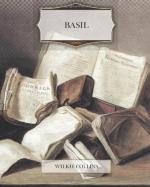-----
“Well: I started in life with the hangman’s mark on me—with the parent’s shame for the son’s reputation. Wherever I went, whatever friends I kept, whatever acquaintances I made—people knew how my father had died: and showed that they knew it. Not so much by shunning or staring at me (vile as human nature is, there were not many who did that), as by insulting me with over-acted sympathy, and elaborate anxiety to sham entire ignorance of my father’s fate. The gallows-brand was on my forehead; but they were too benevolently blind to see it. The gallows-infamy was my inheritance; but they were too resolutely generous to discover it! This was hard to bear. However, I was strong-hearted even then, when my sensations were quick, and my sympathies young: so I bore it.
“My only weakness was my father’s weakness—the notion that I was born to a station ready made for me, and that the great use of my life was to live up to it. My station! I battled for that with the world for years and years, before I discovered that the highest of all stations is the station a man makes for himself: and the lowest, the station that is made for him by others.
“At starting in life, your father wrote to make me offers of assistance—assistance, after he had ruined me! Assistance to the child, from hands which had tied the rope round the parent’s neck! I sent him back his letter. He knew that I was his enemy, his son’s enemy, and his son’s son’s enemy, as long as I lived. I never heard from him again.
“Trusting boldly to myself to carve out my own way, and to live down my undeserved ignominy; resolving in the pride of my integrity to combat openly and fairly with misfortune, I shrank, at first, from disowning my parentage and abandoning my father’s name. Standing on my own character, confiding in my intellect and my perseverance, I tried pursuit after pursuit, and was beaten afresh at every new effort. Whichever way I turned, the gallows still rose as the same immovable obstacle between me and fortune, between me and station, between me and my fellowmen. I was morbidly sensitive on this point. The slightest references to my father’s fate, however remote or accidental, curdled my blood. I saw open insult, or humiliating compassion, or forced forbearance, in the look and manner of every man about me. So I broke off with old friends, and tried new; and, in seeking fresh pursuits, sought fresh connections, where my father’s infamy might be unknown. Wherever I went, the old stain always broke out afresh, just at the moment when I had deceived myself into the belief that it was utterly effaced. I had a warm heart then—it was some time before it turned to stone, and felt nothing. Those were the days when failure and humiliation could still draw tears from me: that epoch in my life is marked in my memory as the epoch when I could weep.




